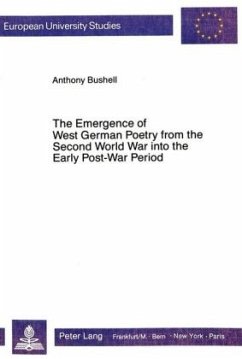Drawing on a broad selection of West German poetry appearing in the early post-war years, this study attempts to establish not only the range and nature of these poetic works, but also the contributory forces and constraints upon poets in coming to terms with a defeated and occupied Germany. The dismissive attitude in later criticism towards the genre of this period is seen to be based on a failure to appreciate certain developments within poetry since Baudelaire. These developments made it uniquely difficult for poetry to respond in convincing aesthetic terms to the historical reality of war and the Third Reich. Those poets who did attempt to reflect directly upon Germany's past from the perspective of a provisional presence are shown to have had recourse to markedly regressive poetic forms, and their work is the subject of detailed analysis.
"...one must be grateful to Dr Bushell for having revealed to us the full interest of this little known period in poetry." (R.A. York, Journal of the Modern Language Association of Northern Ireland)
"Der vorliegende Sammelband enthält interessante Informationen sowie Überlegungen über die österreichische Literatur. Ein konzeptionell durchdachtes und geschlossenes Ganzes bildet es jedoch kaum. Trotz dem kann er auch für Germanisten lehrreich sein, und nicht nur für die." (Gabriela Vesela und Jiri Vesely)
"Der vorliegende Sammelband enthält interessante Informationen sowie Überlegungen über die österreichische Literatur. Ein konzeptionell durchdachtes und geschlossenes Ganzes bildet es jedoch kaum. Trotz dem kann er auch für Germanisten lehrreich sein, und nicht nur für die." (Gabriela Vesela und Jiri Vesely)

